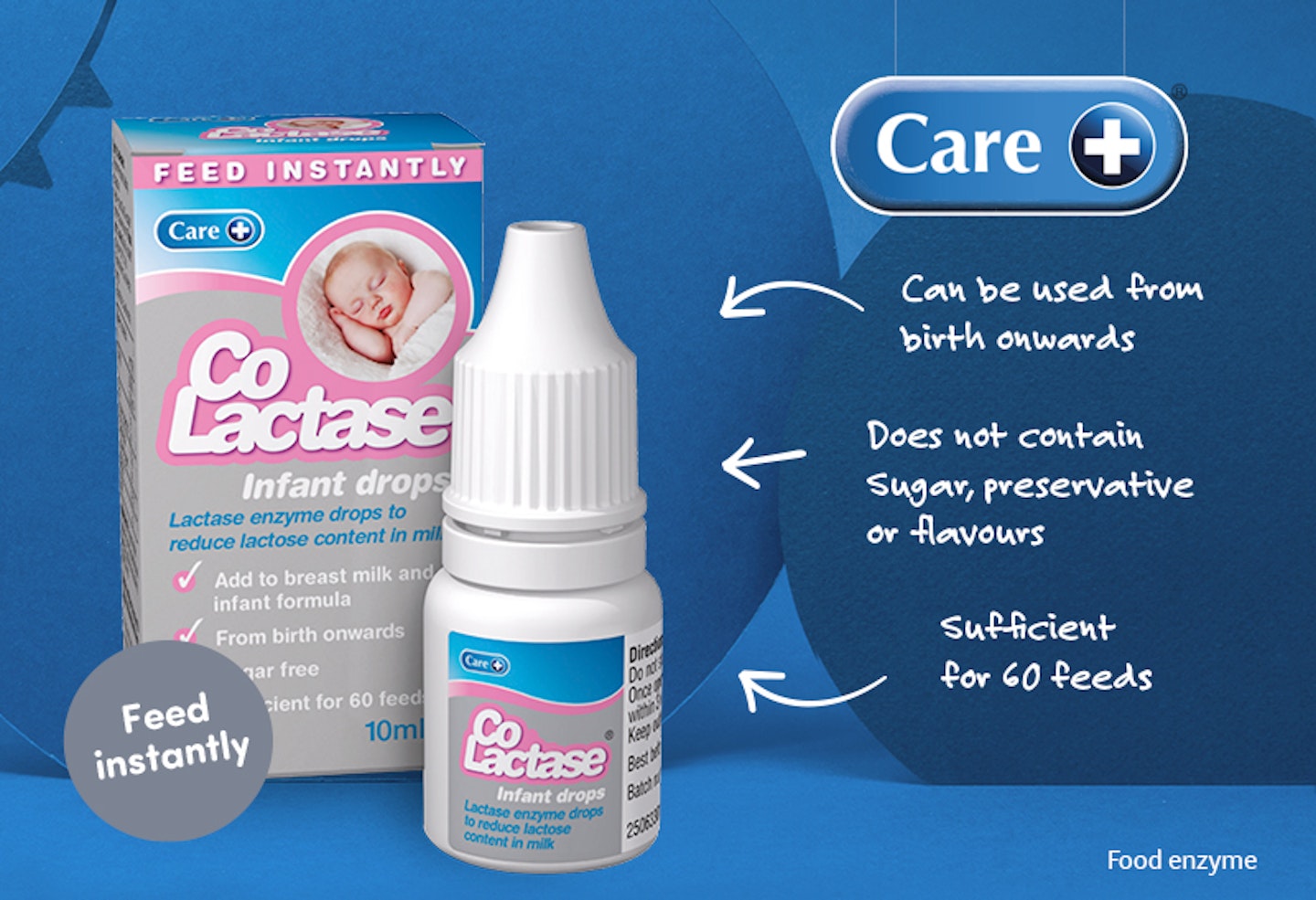Advertisement Feature
Care+ Co-Lactase Infant Drops are lactase enzyme drops used to reduce the lactose content in breastmilk and infant formula.
Suitable from birth, the Care+ Co-Lactase Infant Drops do not contain sugar, preservatives or flavouring and is advised to feed instantly after adding to both breastmilk and infant formula. These drops can be used for babies who are being breastfed or being given formula – without interfering with the feeding process.
About lactose
Lactose is a complex sugar found in milk, dairy products, baby formula and breastmilk. It's the enzyme produced by our bodies to break down lactose into more simple sugars so our bodies can absorb it.
Other product information
-
Lactase drops used to reduce lactose content in breastmilk and infant formula
-
First Instant feed drops to hit the market
-
One bottle is sufficient for 60 feeds (add 4 drops to warm breastmilk or infant formula, before each feed)
-
Does not contain sugar, flavours or preservatives
-
Can be used from birth onwards

Directions for use
-
Breastfeeding: Express a few tablespoons of breastmilk into a small sterilised container. Add 4 drops of Care+ Co-Lactase. Give this to her on a sterilised plastic spoon or using a syringe and continue breast feeding as normal
-
Expressed breastmilk: Defrost the milk if necessary and warm to feeding temperature Add 4 drops of Care+ Co-Lactase to the milk when warm. Please note: do not add Care+ Co-Lactase to milk if it's hot. Shake the milk and feed as normal. Discard any unused milk.
-
Infant formula: Make the baby formula according to the manufacturer’s instructions. Add 4 drops of Care+ Co-Lactase to the formula when at feeding temperature. Please note: do not add Care+ Co-Lactase to the formula if it is hot. Shake the formula and feed as normal. Discard any unused formula.
-
Making formula in advance: Make the baby formula according to the manufacturer’s instructions. Add 2 drops of Care+ Co-Lactase to warm (not hot) milk and store in the fridge for a minimum of 4 hours. The prepared formula must be used within 12 hours of making it. Warm to feeding temperature as normal when you need to feed. Discard any unused formula.
-
Ready to feed formula: Warm the formula to feeding temperature. Add 4 drops of Care+ Co-Lactase to the formula when warm. Please note: do not add Care+ Co-Lactase to the formula if it is hot. Shake the formula and feed as normal. Discard any unused formula.
As always, please consult a GP or pharmacist before using any medicines or drops.
Some frequently asked questions when related to your little one's digestive system
Why does my newborn still root (sucking motions) even though she is bottle fed?
This could be related to ‘Flutter sucking’ meaning your baby is simply comfort nursing. Although typically seen in breastfed babies, and although a baby will still get a little milk, it’s mainly for helping a baby sleep, to calm them down and because baby enjoys sucking.
My six -week-old often brings up some of her milk feed. How much is normal and when should I worry?
Reflux in babies is normal in babies and typically starts from 8 weeks old. There is not set amount of reflux that is considered normal, every baby is different. However if you’re worried about your little one, the NHS suggests to see your GP if:
-
After 2 weeks of trying to improve things don’t ease
-
Your baby gets reflux after they’re 6 months old
-
Your baby is not gaining weight or is losing weight
Can I eat anything during pregnancy to encourage better digestion for my baby before they even arrive?
When you’re pregnant, it’s important to get the right balance of nutrients that you and your baby need. There are is a lot of advice out there that suggests what you eat can effect your baby, however our UK guidelines are to keep a well-balanced healthy diet. Nutritionist Helena Gibson-Moore tells Mother&Baby, "a third of your diet should be made up of fruit and vegetables" and that "variety's important". As well as containing health-boosting vitamins and minerals, they’re a good source of fibre which helps improve digestion and can prevent that all-too common pregnancy side effect - constipation.
Is breastmilk better for my baby’s digestion than formula?
NHS guidelines state a baby must be breastfed for the first 6 months of their life. According to the NHS, ‘your breast milk provides the perfect combination of vitamins and nutrition, it's also much easier to digest than first infant formula.’ Research shows breast milk contains enzymes which help with digestion, such as amylase, lipase and protease. However, every mum and baby is different – follow your instincts and do what’s best for you and your baby. If in doubt also contact your GP or Health Visitor.
How can I help my baby’s digestion?
Your baby’s digestive system can give you endless worries in the early days. Work out what’s making him uncomfortable – and how to get him happy again. Some tips include: - Feed your baby little and often and keep your baby upright for 30 minutes after a feed to avoid reflux issues. But for some babies, reflux is painful and if you baby refuses to feed, you should see your GP.
-
Adjust your feeding position
-
Give baby tummy time
-
Baby massage can be a soothing and extremely helpful way to help baby’s digestion
-
Wind your baby! "For some babies, wind can be incredibly painful and upsetting," says parenting expert Fi Star-Stone. "It can take time and patience to soothe them and dislodge the wind, but after every feed, you should ensure you get 3-4 big burps.
How do I know if my baby has digestive problems?
Some signs to look out for are vomiting more often than usual (use your mum instincts), seeming unusually drowsy, unusual bowel movements (you’re looking for green and brown poo! Any black or blood needs to be looked at). If you’re ever in any doubt consult your GP or Health Visitor right away.
How long does it take for my baby’s digestive system to mature?
From birth you baby’s digestive system is still developing and maturing, this why it’s recommended your baby has only breastmilk from 0-6 months old. From 6 months your baby’s digestive system has developed enough to cope with solid foods. However this does differ from baby to baby, so consult your health visitor if you have questions or concerns about starting weaning your baby sooner or later than 6 months.
When does reflux disappear?
Typically reflux lasts from about 2-12 months. By the time your little one is 18 months – 24 months old, reflux should have disappeared.
How do I know if my baby has reflux?
Signs your baby has reflux include bring up milk, or being sick during or after feeding.
Can babies take digestive enzymes?
There are plenty of brands to encourage a healthy digestion and relieve things like colic (severe pain in the abdomen caused by trapped wind). Seek advice from a GP, pharmacist or health visitor before giving your little one any over-the-counter bought products.
How do I know if my baby is vomiting too much?
Vomiting is common in babies. In most cases vomiting doesn’t last longer than one or two days. Contact your GP if your child is unable to do things like, hold down any fluids, is vomiting green bile or blood, if they have been vomiting for a day or two. Trust your instinct and always seek advice from a GP if you’re worried.
What signs should I look out for in my baby’s poo that something is wrong with their digestive system?
As we’ve mentioned above if your little one’s stool is black or contains any red (blood looking) bits contact your GP. Baby poo comes in various colours. Baby poo can also differ in colour if little one is breast fed or formula fed. Generally you’re looking for yellow, green and brown poo. If you baby’s poo is hard and looks like pebbles, this could be a sign he is constipated.
How can I help cure constipation?
Some things that could help with baby’s constipation baby massage and tummy time. If you’re concerned your child may be constipated, speak with your GP to discuss your options.
Can switching from breastfeeding to bottle feeding affect my baby’s digestive system?
Formula is thicker than breast milk so it can take longer to pass through your little one’s digestive system. The shift between breast milk and formula could cause things like constipation or colic, but keep an eye out for regular bowel movements and always consult your GP or health visitor if you have any concerns.
